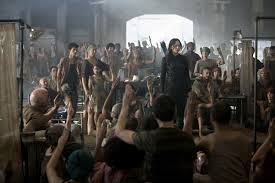Is There Balm in Gilead: Movie reviews of Aloha and Love & Mercy by Howard Casner
Posted: June 10, 2015 | Author: Donald | Filed under: Uncategorized | Tags: Alec Baldwin, Aloha, Beach Boys, Bill Murray, Bill Pohlad, Bradley Cooper, Brian Wilson, Cameron Crowe, Danny McBride, Elizabeth Banks, Emma Stone, Eugene Landy, John Cusack, John Krasinski, Love & Mercy, Melinda Ledbetter, Michael A. Lerner, Oren Moverman, Paul Dano, Paul Giamatti, Rachel McAdams | 813 Comments »First, a word from our sponsors. Ever wonder what a reader for a contest or agency thinks when he reads your screenplay? Check out my new e-book published on Amazon: Rantings and Ravings of a Screenplay Reader, including my series of essays, What I Learned Reading for Contests This Year, and my film reviews of 2013. Only $2.99. http://ow.ly/xN31r
and check out my Script Consultation Services: http://ow.ly/HPxKE
Warning: SPOILERS
 I’m not sure that I can really add to the general response to the movie Aloha (it’s 20% at rottentomatoes.com and I don’t think the box office is of the more optimistic size), but far be it from me not to join in and kick a man while he’s down.
I’m not sure that I can really add to the general response to the movie Aloha (it’s 20% at rottentomatoes.com and I don’t think the box office is of the more optimistic size), but far be it from me not to join in and kick a man while he’s down.
About three quarters of the way through the new rom com written and directed by Cameron Crowe (who also gave us the very good Almost Famous, Say Anything and Singles, but not much else since except for, well, Jerry “Show me the money” McGuire, but, no, I’ll stick with not much else since, thanks), I turned to my friend Jim and said, “I’m sorry, but I have to be honest: I have no idea what’s going on here”.
Jim laughed and sighed in relief because he had no more of a clue than I did.
The plot eventually does make sense; well, within the context of a not particularly well written movie it makes sense, but overall, as a piece of writing, it really makes little sense at all.
NO MORE FUN AND HUNGER GAMES or THE REVOLUTION WILL BE TELEVISED: Movie review of The Hunger Games: Mockingjay-Part I by Howard Casner
Posted: November 28, 2014 | Author: Donald | Filed under: Uncategorized | Tags: Danny Strong, Donald Sutherland, Elizabeth Banks, Francis Lawrence, Jeffrey Wright, Jennifer Lawrence, Josh Hutcherson, Julianne Moore, Liam Helmsworth, Peter Craig, Philip Seymour Hoffman, Stanley Tucci, Suzanne Collins, The Hunger Games: Mockingjay-Part I, Woody Harrelson | 8 Comments »First, a word from our sponsors. Ever wonder what a reader for a contest or agency thinks when he reads your screenplay? Check out my new e-book published on Amazon: Rantings and Ravings of a Screenplay Reader, including my series of essays, What I Learned Reading for Contests This Year, and my film reviews of 2013. Only $2.99. http://ow.ly/xN31r
Warning: SPOILERS
 Okay.
Okay.
How to start.
Well, there’s really no point in putting it off.
At the risk of losing what little reputation I have (if I even have one); at the risk of inviting ridicule, derision, mockery and scorn from those who read my reviews who don’t already hold me in ridicule, derision, mockery and scorn; and at the risk of being reviled by serious filmgoers far and wide…
The Hunger Games: Mockingjay-Part I is not nearly as bad as the critics claim it is and is by far the best entry in the franchise to date, far better than the first two films. Read the rest of this entry »
Movie Reviews of THE LEGO MOVIE and IN SECRET by Howard Casner
Posted: February 17, 2014 | Author: Donald | Filed under: Uncategorized | Tags: Charlie Stratton, Chris Pratt, Christopher Miller, Dan Hageman, Elizabeth Banks, Elizabeth Olson, In Secret, Jessica Lange, Jonah Hill, Kevin Hageman, Liam Neeson, Morgan Freeman, Oscar Isaac, Phil Lord, The Lego Movie, Therese Raquin, Todd Hanson, Tom Felton, Will Farell | 3,508 Comments »In a perfect world, if someone went to the bigger of the big shots, the higher of the higher ups, the muckier of the mucky-mucks, at a studio and pitched them the idea of making a movie based on Lego blocks, he would have been hung, strung and quartered in such a way as to be sure that he could never have progeny so such a suggestion could never be made again (I mean, just think how much pain and suffering we would have avoided if they had done that for Battleship). But alas and alac, this is not a perfect world.
And to demonstrate just how imperfect this world is, not only did someone go to some big shot, high up mucky-mucks at a studio and pitch it, the studios said okay. And to demonstrate even more concretely how imperfect a world we’re stuck in, the damn thing that resulted from such a preposterous and inexcusable idea is a fun, exciting, clever little film with more wit that you’d expect from a piece of block plastic and a funny group of yellow bodied puppets.
Is The Lego Movie any good? I don’t know. The movie never stops long enough for you to come to a conclusion one way or the other. From the opening shots of our hero Emmet getting out of bed and singing an annoyingly upbeat song (annoying because it’s catchy and exciting and makes you want to stand up and jump around to it) to the huge battle scenes to the final tug at your heartstring moments, the movie rushes by as if it were all the outtakes from a Fast and Furious movie.
I mean, it has more energy than a nuclear power plant, than Michael Jackson on speed, than the wattage of a Shirley Temple smile. If you looked up “forward momentum” in the dictionary, it would have a picture of this movie next to it.
It’s certainly not perfect. The screenplay is both witty and clever, and even a tad on the brilliant side at times, while at others it’s a bit clunky. The attempt to set up Emmet as a guy so ordinary no one knows who he is doesn’t quite click, and it’s unclear how this view of his character parallels his real life counterpart. And the changes of hearts at the end seem a little forced.
And one is also just a bit alarmed that the writers, Phil Lord and Christopher Miller (who also directed) and Dan and Kevin Hageman, know so much about Lego’s and seem so immersed in their history and place in pop culture that they can come up with tons of inside jokes. Are they now e-mailing their parents and telling them, “See, I told you those hours we spent in the basement playing with these things rather than learning about world history and algebra or watching porn would pay off some day”.
But what is the point of quibbling (other than apparently it’s just what I do—ask my friends). What can I really say about it except go, have fun, eat some overpriced popcorn. It’s worth it. The Lego Movie is one of the funnest, mostest entertaining time wasters you’ll see all year and there’s no point in fighting it.
I do think, though, that I should weigh in on the controversy from some conservative media outlets that the movie is an attack on big business. I didn’t see it. I mean, I saw it in Jason Segel’s The Muppets. Like who couldn’t tell that was a pretty on the nose attack on Trumpers of every size, shape and form. And I suppose one can see why some would automatically jump to the conclusion here that The Lego Movie is Stalinist plot to overthrow the minds of American younth in that the bad guy is called Lord Business.
But it seems obvious from the context that the conflict in the movie isn’t between the proletariat who control the means of production and the nasty, old capitalists (and I’m not mentioning names, Koch brothers) who exploit labor and would make slavery legal again if they could. The conflict seems more between creativity and seriousness, taking chances and playing by the rules, being a child and being a rigid adult, having fun and being all business (uh-huh, uh-huh, get why the bad guy’s called who he’s called now, get it, get it?).
With the voices of Chris Pratt as Emmet; Will Farell as Lord Business; Liam Neeson as good cop/bad cop; Elizabeth Banks as Wildstyle/Lucy; Morgan Freeman making fun of his god complex as Vitruvius; Todd Hanson making fun of Ian McKellan’s god complex as Gandalf; and Jonah Hill brilliantly cast as Green Lantern.
In Secret is the umpteenth version of Emile Zola’s novel Therese Raquin, about a young woman, Therese (who else), who joins forces with her lover Laurent, an amoral painter, to off her inconvenient husband, the weak and near impotent Camille (which at one time in movie history was as not just a good reason, but a laudable one, to off a husband).
The screenplay is by the director Charlie Stratton adapted not from the book, but from a play version by Neal Bell, which may, perhaps, be one degree too separate for the movie’s own good because I’m afraid this particular version of Therese… never really catches fire and feels very safe and tame, not even up to Masterpiece Theater or Merchant/Ivory standards of engagement.
It’s a movie about people ruled by sexual passion, or the lack thereof, but the fucking and screwing is just this side of PG 13 (in fact, in spite of the almost Puritanically filmed couplings, the most sexually charged moment is a scene where Laurent talks dirty to Therese and Camille as he’s painting the poor hubby’s portrait in the after style of Ivan Albright’s Dorian Gray). It’s a movie with a shockingly violent act at its center, but the act takes place off screen or in vague flashbacks. It’s a movie that takes a full and vibrant character from the book and turns her into a poor, pale, pallid, boring imitation of a victim.
And perhaps that’s the one area where the movie really goes wrong. Of course, it’s a matter of personal interpretation, but in the book (as well as the marvelous TV production with Kate Nelligan and Oldboy’s Chan-wook Park’s vampire version Thirst), Therese is anything but a victim and her benefactor Madam Raquin and her sickly son Camille are not evil sociopaths, just incredibly boring members of bourgeois, sucking the life out of the life that Therese thinks she deserves.
But in making Therese little more than a victim, it sucks the life out of the character even more than Camille and Madame Raquin do in this version of the story. In fact, I always thought of Therese Raquin as a 19th century forerunner of such great film noirs as Double Indemnity and The Postman Always Rings Twice (which to a great degree, have the same basic plot) and Therese a forerunner to such femme fatales as Phyllis Dietrichson and Cora Smith.
Elizabeth Olson stars as Therese, but there’s a certain blandness to her that doesn’t help here and there’s little flesh and blood she can bring to a character that has no real flesh and blood in the first place. Jessica Lange as Madame does what is required of her, while Tom Felton has a nice change of pace roll from bully to bullied as Camille. Oscar Isaac gives the strongest performance, but even he is hampered by an uninteresting screenplay.











